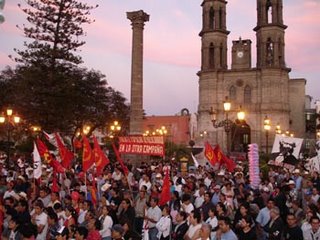The Struggle is a Battle
 February 8, 2006
February 8, 2006The Other Campaign has made a point of expressing its inclusiveness, it’s openness, its desire for diversity and its love of difference. But it also makes a point of avoiding any kind of relativism—the lack of judgment or discernment that asks, ‘who are we to say who’s right?’ To each their own, perhaps, but this is an embrace of difference and uniqueness, not an indiscriminate acceptance. In a February 2nd meeting, in Jalapa, Veracruz, one participant says, in a plea for peaceful coexistence, “we are all human beings.” Marcos, when it is his turn to speak, responds, “No. Yes we are all human beings, but some of us are real assholes and some of us aren’t’. And that’s the truth. Some have built their wealth on the misery, death, and exploitation of others. What we want is to organize, discuss, and make conscientious this sector [of the exploited] in order to together confront them. Because if we don’t, if we let them continue, they’re going to destroy everything. This much has been demonstrated. If we don’t do something now there’s not going to be anything to fight for.” Subdelegado O continues this point in another meeting, making clear the Other campaign is not a matter of peaceful coexistence, nor simply an objection and a pleas for justice. The proposal of the 6th Declaration and the Other Campaign may be unarmed and nonviolent, but it is still a battle: “Now we’re not just going to be resisting. We’re going on the offensive. We’re saying clearly that we’re going after them.”
That this is a struggle as a battle, not a struggle as a lobbying campaign, legal dispute, or difference of opinion is also clear. In separate occasions, both in the Yucatan peninsusla, Subdelegado O adds a distinction: when we criticize the PRD and the “leftist” politicians in Mexico we are not disputing a party platform or a policy. We are talking about acts of violence that have been committed against our communities by the PRD (a result of which one of our companeros is surviving with a bullet still lodged in his skull). We are talking about the fact that not only have they betrayed us (with the meaningless, watered-down indigenous law) but they have tried to kill us (the PRD ambush in Zinacantan on Zapatista support bases returning to their communities after delivering water to comrades whose water had been cut by the local PRD). He adds, later: the Other Campaign defines an enemy, not an adversary. With an adversary you can be in agreement on some things, with an enemy, no. When the Other Campaign defines itself as ant-capitalist it says, “our survival comes with death of what is in front of us now,” not a compromise.
 The friend-enemy distinction, though, is not identifying a person who represents the other side, but rather a system which has practices and valorizations that must be fought wherever they are found.
The friend-enemy distinction, though, is not identifying a person who represents the other side, but rather a system which has practices and valorizations that must be fought wherever they are found.The Other Campaign has been clear and broad in claiming its friends—workers, young people, … clear in defining its enemy—capitalism, the party system, the electoral/representational model of governance, and clear in defining who it will accept as allies and who not. When Evo Morales invited the Zapatistas to his inauguration, they didn’t grace the invitation with a direct response, but when asked on the road in the Other Campaign if they would go, Subdelegado O responded: “Yes, they invited us and we received the invitation, but we’re not going to go because we are in the Other Campaign from below. The EZLN does not relate to governments, good or bad. No, we relate to peoples. And in this case, if the Bolivian people say yes [to Evo], well re respect that, but we don’t go to presidential inaugurations, good or bad. Our way is what we are doing now, and that it how we have gotten to where we are now. (Narco News report, January 16, 2006). This is important: what is happening in Mexico is not the same thing as leftist electoral politics in South America. It is not even worthy of alliance. The Zapatistas could gain enormous resources and recognition from these high-profile leftist state leaders who would be delighted to have Zapatista support or even contact, but this is a clear disinterest in and open rejection of that route. Yesterday in Oaxaca, he repeated the point, after a young
 man apologized for his “pessimism,” but that there could be no success for the Other Campaign in Mexico if they don’t join the present momentum in Latin America with its “seven leftist presidents.” Delegado O replied that he wasn’t pessimistic, but rather mistaken: “Looking at their trajectories, as many times as I count, I don’t come up with seven.” He added, When we say that we don’t turn toward Latin America nor Bolivia, we are saying clearly: we don’t turn in any direction toward above, we always turn toward those below, and that’s why we’re here with you right now in this meeting and not in a presidential inauguration.”
man apologized for his “pessimism,” but that there could be no success for the Other Campaign in Mexico if they don’t join the present momentum in Latin America with its “seven leftist presidents.” Delegado O replied that he wasn’t pessimistic, but rather mistaken: “Looking at their trajectories, as many times as I count, I don’t come up with seven.” He added, When we say that we don’t turn toward Latin America nor Bolivia, we are saying clearly: we don’t turn in any direction toward above, we always turn toward those below, and that’s why we’re here with you right now in this meeting and not in a presidential inauguration.”The anti-electoral politics position is not about abstentionism or the lack of a responsible party that follows through with its promises. The EZ clarifies, “They keep saying that Marcos is promoting electoral abstention. No, comrades, it’s that we have encountered and abstentionist movement that identifies with what we’re saying because they’re sick of the political class. And if it has been assumed that abstentionism is apathy, the Other Campaign is discovering that it is rather a lack of alternatives.” Luis Hernandez Navarro makes a key point in a January 25 La Jornada article: “The radicality of this struggle doesn’t have to do with its illegality, but rather with its capacity to reject the system and construct subjects of change. The project [the Other Campaign] puts at issue the mediations as much as the mechanisms of existing political representations.” In other words, it is not just the existing parties that are the problem, an issue of irresponsibility or corruptio
 n, but rather that the very structure of party organization and electoral representation that must be questioned.
n, but rather that the very structure of party organization and electoral representation that must be questioned.I am talking a lot here about what “Subdelegado O” or the EZLN says, but it is important to note that what the delegado says is not just what he says, or what he says on behalf of the EZ, but the voice he carries from one city to another, between towns and villages, from state to state. One journalist covering on the Other Campaign, (John Gibler, Znet, 2/5/06), reported on one of the small town meetings where an older woman took the microphone and said of Marcos, “The wisdom of this man is that he keeps quiet so we have to listen to each other.”

0 Comments:
Post a Comment
<< Home